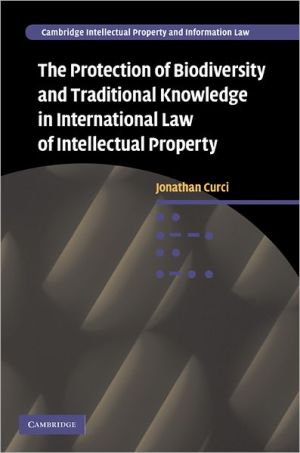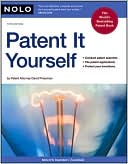The Protection of Biodiversity and Traditional Knowledge in International Law of Intellectual Property
As its economic potential has expanded rapidly, intellectual property has become a subject of front-rank legal importance. Cambridge Intellectual Property and Information Law is a series of monograph studies of major current issues in intellectual property. Each volume contains a mix of international, European, comparative and national law, making this a highly significant series for practitioners, judges and academic researchers in many countries.\ International intellectual property...
Search in google:
As its economic potential has expanded rapidly, intellectual property has become a subject of front-rank legal importance. Cambridge Intellectual Property and Information Law is a series of monograph studies of major current issues in intellectual property. Each volume contains a mix of international, European, comparative and national law, making this a highly significant series for practitioners, judges and academic researchers in many countries.International intellectual property treaties, the United Nations international environmental treaties (first and foremost the Convention on Biological Diversity), the relevant customary norms, and soft law form a complex network of obligations that sometimes conflict with each other. The first set of treaties creates private rights while the latter affirms the sovereignty rights of states over genetic resources and related knowledge and create international regimes of exploitation of the same.Jonathan Curci proposes solutions to the conflicts between treaties through the concept of "mutual supportiveness," including the construction of a national access- and benefit-sharing regime; mandatory contractual provisions in relevant international contracts; a defensive protection when genetic-resource-related traditional knowledge is unjustly patented, through the analysis of the concepts of "ordre public and morality"; "certificate of origin" in the patent application; and "novelty-destroying prior art" and positive protection through existing and sui generis intellectual property rights and misappropriation regimes.
List of abbreviations viiAcknowledgments xiPart I The main problems 11 Introduction to legal issues related to genetic resources and traditional knowledge in the international intellectual property system 31.1 Defining the problems 41.2 Some methodological aspects 17Part II The protection of genetic resources in intellectual property law 272 The TRIPS Agreement and the patent protection of genetic resources 292.1 The general principles of the TRIPS Agreement 292.2 The patentability of biotechnology 362.3 Economic considerations on biotech-patents and their interaction with traditional knowledge 422.4 Conclusion 483 The relationship between the TRIPS Agreement and treaties protecting genetic resources and traditional knowledge 503.1 The impact of the TRIPS Agreement on CBD obligations 513.2 The impact of UPOV on the freedom of exchange of seeds 623.3 Some international intellectual property aspects of the FAO ITPGRFA 623.4 Conclusion of Part II 85Part III The protection of traditional knowledge in the international patent system 874 Towards clearer legal definitions 914.1 An intellectual property approach to the concept of traditional knowledge 914.2 A few relevant analytical distinctions on biodiversity and related traditional knowledge 955 The construction of an access- and benefit-sharing regime and intellectual property issues: criteria and options 1035.1 The CBD mandated access- and benefit-sharing regime 1045.2 An access- and benefit-sharing regime and the contractual solution 1056 The defensive protection of traditional knowledge in international patent law 1316.1 The certificate on the disclosure of origin/source 1326.2 Traditional knowledge as prior art 2086.3 Ordre public and morality as exception to patentability 2337 Positive protection of traditional knowledge 2757.1 Positive protection of plant genetic resources and related traditional knowledge in provider countries 2757.2 Protecting traditional knowledge through the implementation of Article 27.3(b) of TRIPS 2777.3 The creation of new intellectual property rights for plant genetic resources related to traditional knowledge 2857.4 The protection of traditional knowledge through unfair competition 3047.5 Trade secrets 3117.6 Applying patent law to traditional knowledge innovation 3137.7 Overview on the utility of geographical indications and trademarks 3158 Final observations 326Index 334








